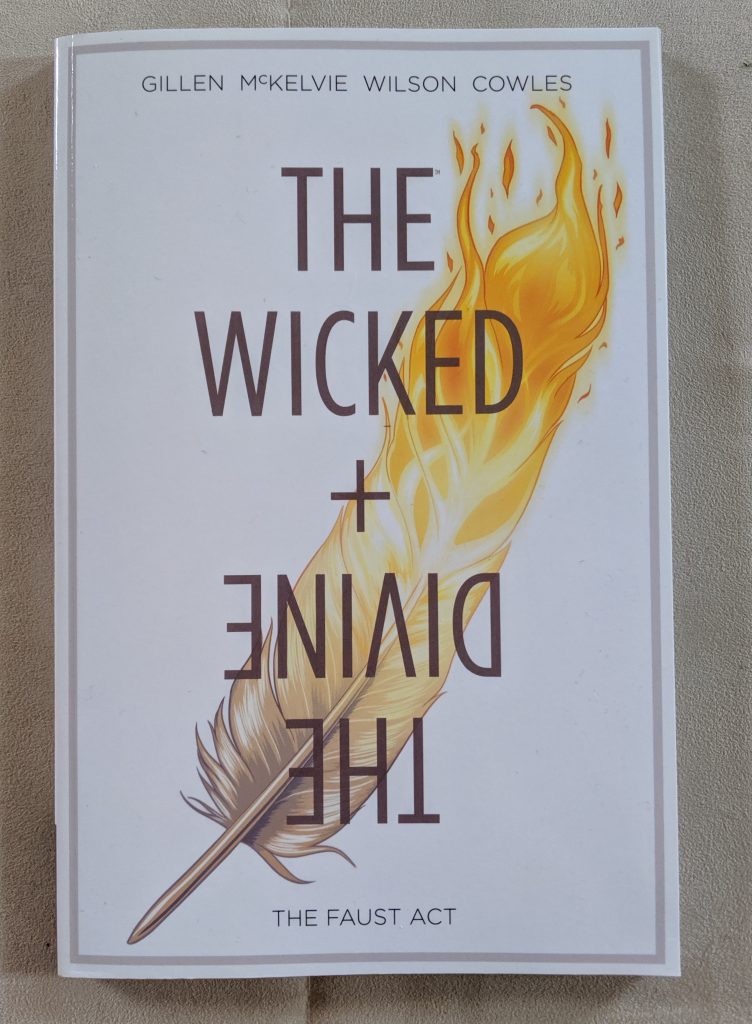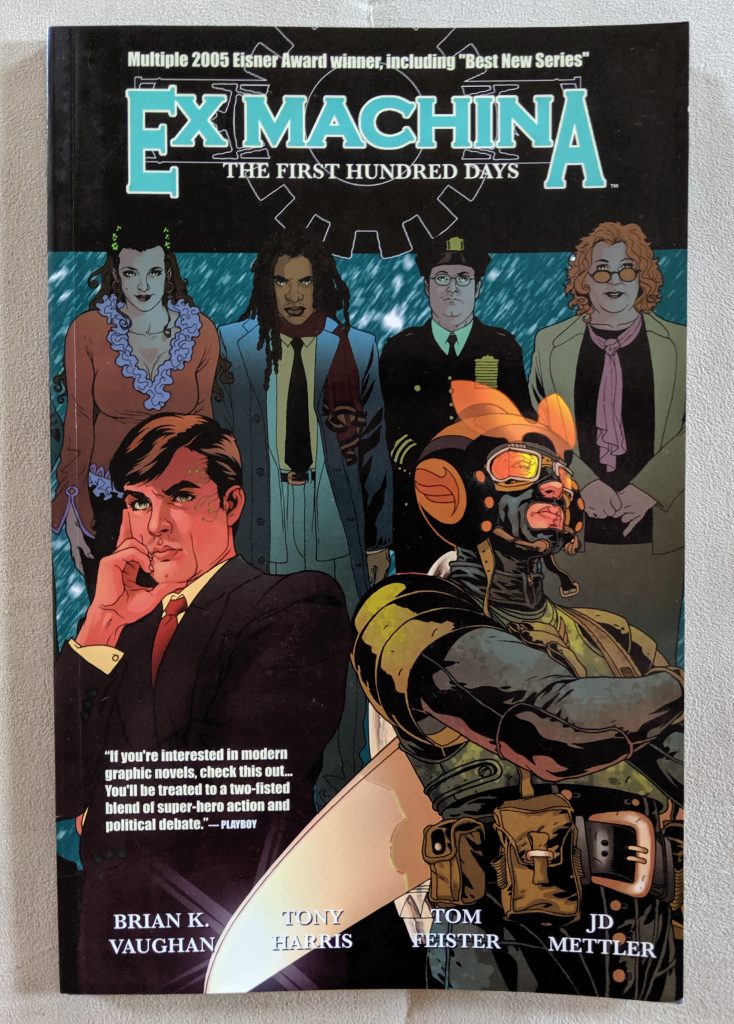@thecomichunter has a permanent 2-for-1 sale on used comics, so on Friday I found two Volumes 1 of series I haven’t read, that were both priced at $9.99.

I’ve been meaning to read this comic for a while, since I heard it was captivating, “Gaimanesque,” and non-cis-white-hetero-dude-centric. But every damn time I walked into the comic book store, I forgot it’s dang name. Cue (at least 4 times): “Do you have The Sacred and The Profane. Or something like that? The Cursed and the Blessed? Angels and Demons?!” But then (when I finally found Vol 1) I got cold feet, because it looked awfully violent and it had a kind of cheesy premise:
Every ninety years twelve gods return as young people. They are loved. They are hated. In two years, they are all dead. It’s happening now. It’s happening again.
Back cover, Vol. 1
But I gave it a shot, and oh gods I’m so glad I did. “Set my heart aflame” all right. If I were to “8th-grade-book-report” this [source, and what I’m actually referring to as told by Tufekci and Ellis], I’d say the theme is the difference between agency and power. As Baal says at the beginning of Issue 4,
“We don’t get to change anything. We get to change you, and then you choose what to do with it.”
page not numbered
In today’s world of “influencer gods” (and if you know me, Tufekci and Ellis are core to my own personal pantheon), attention and admiration is a form of power, but under The Algorithms it’s a power to keep doing that thing you’re doing that pleases the masses. Pleases, and maybe shapes. Can the millions of rabid fans of Natalie Wynn and Oliver Thorn actually change the world? Stop global warming, implement UBI, and abolish property? Maybe, if we get our fucking act together. But those “gods” can’t do it on their own.
Back to the book. When I say it is non-cis-white-hetero-dude centric, I mean there are maaaayyybe two named characters who fit that description, but barely get any lines. Basically everybody is female, and has a ton of power, and it’s great. And when they talk about sex (and they do, a lot) it’s because rock-star-power (often) includes being a sex god, and they own it. They are gooooorrrgeoooouuuss but their bodies are never played up for a (presumed straight male) reader to gaze at. If you like women dressed as Bowie, though, you might want to find a towel. Why am I going on about this? I’ll get there…
Our audience-insert (and Faustian) character is Laura, a teen girl who drops out of school to be a groupie. This is such a departure from how other comic books (and society in general) have treated this stereotype of rabid super-fan, and the concept of female fandom in general. That was refreshing, though (spoilers!) I get the feeling that she’s “more than” the normal teenager that she seems.
I’m terrible at reviews, but here are some stray thoughts:
- I did not get all the musical references, but a quick bit of Googling made Laura and Luci’s first conversation a little bit clearer. Apparently they have an accompanying #wicdiv playlist? Makes me feel a little bit better about including an audio suggestion in my last college paper.
- I was tickled by how Laura was portrayed at being bad at research (“oh god no don’t make me go to page 2 of google”) before being ribbed about it by a woman with a Masters’ degree (“Little Miss My-first-search-engine”). Info literacy ftw!
- “1-2-3-4” is super cute motif and I wish I could work it in here somehow. Oh. Heh.
- The art was amazing, the use of panels and space and eyeflow and “camera” angles was quite excellent.
In contrast:

I liked Brian K. Vaughan’s work in Saga, though to be honest I got a bit bored because it felt like it was going nowhere, and quit reading a while ago. This was quite different, and, sigh, I think I’ll quit reading now.
Other reviewers took issue with the scale of the narrative and the presence (or lack thereof) of New York City as a character in its own right. I can agree, though am not an expert storyteller and did not pick up on those myself. But it just seems like it’s not a story worth sticking around for.
Premise: A civil engineer gets superpowers from a mysterious probably-alien object and becomes Magneto-for-all-things-mechanical. After a short misguided career as a vigilante, “The Great Machine” hangs up the helmet and becomes mayor of New York City. Oh, this engineer is a straight white cis het dude. So, classic power fantasy meets reality makes this a “modern” comic. He has to deal with an attempted assassination, a couple of murders during a blizzard, and a publicity debacle including racially-charged artwork at a publically-funded museum. His attempts at getting involved usually just screw things up more, and supporting characters actually solve all the narrative’s problems. Yet this is somehow his story – of how hard it is to rule a city that doesn’t want to be governed, when you have to consider so much more than yourself. *eyeroll*. There’s also a bunch of casual racism, homophobia, ableism, and misogyny. We usually say “it didn’t age well” but you know what? It was hurtful then too. Oh, I promised to get back to the male gaze, but I really don’t want to. It’s there. It’s gross.
The art feels claustrophobic, which is uncomfortable but suits the theme, and interestingly? the fun-shit-in-the-back-of-the-comic-book shows how they created the storyboards using photographs of actors, then illustrated based on that. It’s lifelike, I guess, but feels creatively constrained, and ends up looking a little tableau-ish.
The Black character was cast as a white actor.
So I guess it embodies its own theme, of the challenges faced by well-intentioned white guys when trying to fix “the great machine” of society on their own, without interrogating how the machine works, who it runs for, or whether mechanical determinism is a good metaphor for society in the first place.
[Edited because I didn’t want to stand behind the phrase “it didn’t age well”.]